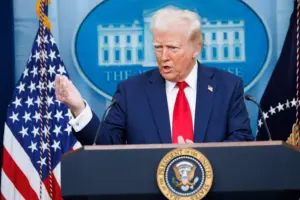The International Monetary Fund (IMF) on Tuesday revised down its 2025 growth forecasts for several major Asian economies, citing heightened trade tensions and growing global uncertainty.
According to its April outlook, the IMF downgraded China’s GDP growth estimate from 4.6% to 4%, falling short of Beijing’s official target of “around 5%.” India’s forecast was also lowered, from 6.5% to 6.2%, below its own fiscal year projection for 2025–2026.
Japan saw a similar adjustment, with its 2025 growth expectation cut from 1.1% to 0.6%, well below the country's internal goal for the fiscal year.
Globally, the IMF slashed the overall growth forecast for 2025 from 3.3% to 2.8%, citing the widespread effects of protectionist trade policies as a “major negative shock” to the world economy.
The Fund specifically highlighted that not only the tariffs themselves but the unpredictable nature of these measures is discouraging investment, weakening business sentiment, and clouding future projections.
Since reassuming office on January 20, U.S. President Donald Trump has imposed a series of tariffs on steel, aluminum, and automobiles. On April 2, he announced a broad-based “reciprocal tariff” strategy targeting nearly every trading partner, applying a baseline 10% import duty.
Just a week later, however, Trump temporarily suspended additional duties—except on China—leaving in place only the general 10% tariff. Meanwhile, the U.S.-China trade war escalated rapidly: U.S. tariffs on Chinese goods have surged to as high as 245%, while China responded with 125% duties and vowed to “fight to the end.”
In contrast, both Japan and India adopted more conciliatory approaches. Japan sent a high-level trade delegation to Washington. Although Trump claimed “big progress,” chief negotiator Ryosei Akazawa returned to Tokyo empty-handed, stating Japan found the tariff moves “extremely regrettable” and urged the U.S. to reconsider.
India’s Prime Minister Narendra Modi also met with U.S. Vice President JD Vance on Monday. The joint readout described “significant progress” toward a mutually beneficial India-U.S. bilateral trade agreement.
The IMF warned that failure to stabilize trade relations may result in further downward revisions to global growth, with export-driven Asian economies particularly vulnerable to prolonged uncertainty and fragmentation in global trade flows.





